 W
WBirgitta Festival is an Estonian musical theatre festival which every year takes place in Pirita convent, Tallinn. The festival is only in kind in Baltic states. The festival is organised by Tallinn Philharmonics.
 W
WThe coat of arms of Tallinn represents the Estonian capital of Tallinn. Tallinn is located in Harju County, Estonia.
 W
WCulture Factory Polymer was a multidisciplinary centre for artistic creation and diffusion in Tallinn, Estonia. Located in Lilleküla, Kristiine District, on the fringes of the Tallinn city centre, this former toy factory became in 2003 one of the main strong points for alternative un-institutionalized culture in Tallinn.
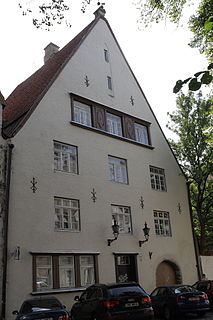 W
WEstonia is an Estonian society which organises theatrical and musical activities. Society existed 1865-1940 and re-established in 1990.
 W
WThe Estonian Dance Festival is a national dance and gymnastics celebration currently held every five years at the Kalevi Keskstaadion in Tallinn, Estonia. The festival is maintained and developed by the Estonian Song and Dance Celebration Foundation. The Dance Festival is usually held on the same weekend as the Estonian Song Festival.
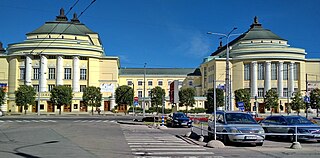 W
WEstonian National Opera is the national opera company of Estonia. The company is based at the Estonia Theatre in Tallinn. The theatre has had several names throughout its existence. The latest one being "The Estonian National Opera", which was adopted in 1998. The company produces a lively and varied season which includes operas, ballets and operettas/musicals with over 500 people currently working at the Estonian National Opera.
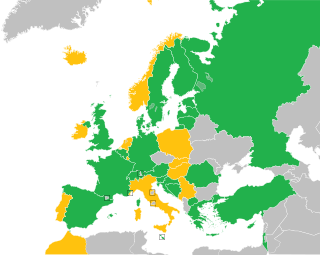 W
WThe Eurovision Song Contest 2002 was the 47th edition of the annual Eurovision Song Contest. It took place in Tallinn, Estonia, following Tanel Padar, Dave Benton & 2XL's win at the 2001 contest in Copenhagen, Denmark with the song "Everybody". It was the first time Estonia had hosted the contest - 8 years after the country made its debut. Organised by the European Broadcasting Union (EBU) and host broadcaster Eesti Televisioon (ETV), the contest was held at the Saku Suurhall, with the final on 25 May 2002. The live show was hosted by Annely Peebo and Marko Matvere.
 W
WThe flag of Tallinn consists of three blue and three white horizontal bars. The ratio of length and width is 2:1 and normal size is 1600×800 mm.
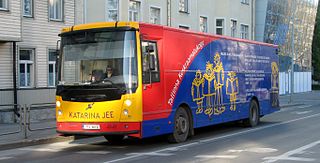 W
WThe Katarina Jee Mobile Library is a Tallinn Central Library bus or Bookmobile operating in Tallinn, Estonia, the first and currently only Bookmobile operating in Estonia. The bus name Katarina Jee refers to a character from the Estonian author August Gailit's novel Toomas Nipernaadi.
 W
WKultuurikatel aka Tallinn Creative Hub is a non-profit foundation and cultural organisation in Tallinn, Estonia situated in the Tallinn Power Plant and a medium between international culture, creative industry and private sector. Kultuurikatel organises events, workshops, performances. Yearly it organises Stalker Festival and is a partner in the Tallinn Music Week.
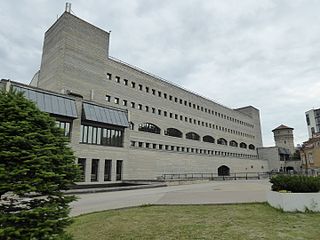 W
WThe National Library of Estonia is a national public institution in Estonia, which operates pursuant to the National Library of Estonia Act. It was established as the parliamentary library of Estonia on December 21, 1918.
 W
WThe New World is a 2011 Estonian documentary film about New World Society, a citizens' initiative in Uus Maailm, Tallinn, that aims to remake neighbourhoods and change people's lives. Written and directed by Jaan Tootsen, it was presented with the award for Best Film by the Estonian Association of Film Journalists.
 W
WNUKU Theatre is an Estonian theatre located in Tallinn. The institution focuses on puppetry. It is currently the only professional puppet and visual theatre in Estonia.
 W
WOld Thomas is one of the symbols and guardians of Tallinn, the capital of Estonia. A weather vane, the figure of an old warrior called Old Thomas was put on top of the spire of Tallinn Town Hall in 1530.
 W
WTallinn Art Hall (Kunstihoone) is an art gallery built in 1934 by Edgar Johan Kuusik on Freedom Square in Tallinn, Estonia.
 W
WTallinn Black Nights Film Festival, or PÖFF, is an annual film festival held since 1997 in Tallinn, the capital city of Estonia. PÖFF is the only festival in Northern Europe or the Baltic region with a FIAPF accreditation for holding an International Competitive Feature Film Program, which places it alongside 14 other non-specialised competitive world festivals including Berlin, Cannes, Venice, Karlovy Vary, Warsaw, and San Sebastian. With over 250 feature-length and over 250 short films and animations from 80 different countries (2018) screened, and an attendance of over 80,000 (2018), PÖFF is the one of the largest film festivals in Northern Europe. The festival, its sub-festivals and the audiovisual industry platform Industry@Tallinn hosted around 1200 film professionals and journalists in 2018.
 W
WTallinn Christmas Market is a Christmas market held every year in Tallinn, Estonia. The modern Christmas market was founded in 1997 and it is open from the last week of November to the first week of January the following year. Founded by Paul Oberschneider, the market brings tourists from all over the world to Tallinn. This is due to the Julian calendar according to which, the Christmas Day of the Russian Orthodox Church is on 7 January.
 W
WTallinn Legends - is a tourist attraction in a form of theatrical and interactive museum in Tallinn, Estonia. The museum recreates historical events and legends that have contributed to the folklore of medieval Tallinn . It uses a mixture of storytelling, live performances and special effects.
 W
WTallinn Music Week (TMW) is an international new music showcase, city culture festival and networking event for music and creative industry professionals, held every spring in Tallinn, Estonia since 2009. Operated by Tallinn-based company Shiftworks OÜ, it showcases emerging artists from all over Europe and beyond, provides a networking platform for music and creative industry professionals, and introduces the city of Tallinn. The festival is attended by around 20,000 people and 1,000 music industry executives yearly. TMW has been acknowledged as an important industry event and attractive tourism destination by The Guardian, New York Times, Forbes, and Experty.by.
 W
WTalsinki is a colloquial name for geographical region of Helsinki, Finland and Tallinn, Estonia, separated by the Gulf of Finland, commonly used when referring to the Helsinki–Tallinn Tunnel. The official Euroregion name for the region is Helsinki–Tallinn Euregion.
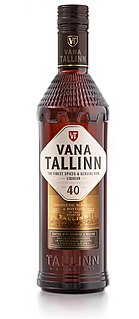 W
WVana Tallinn liqueur is one of Estonia’s hallmark products, manufactured continuously at Liviko since 1960. The spicy flavour of Vana Tallinn liqueur is derived from Jamaican rum, herbs, various spices from around the world, oranges and lemons. Only natural ingredients are used to make Vana Tallinn, including real vanilla pods. The recipe contains more than ten ingredients in total. The recipe for Vana Tallinn was invented in 1960 by the master distiller Ilse Maar, the bottling manager Bernhard Jürno and the distillery specialist Jaan Siimo.